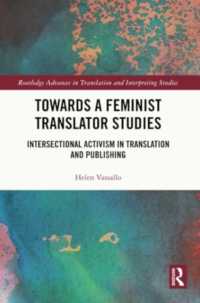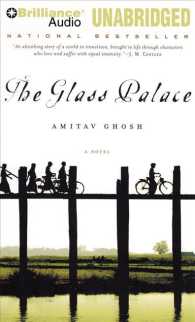- ホーム
- > 洋書
- > 英文書
- > Literary Criticism
Full Description
This book, written in Spanish, takes a literary and cultural studies model to explain the textual representation of the Galápagos Islands since their discovery until present day. The main argument suggests that the depiction of this crucial space for modernity in Western thought, given the rhetoric of travel and fiction writers, transforms the insular area with the intention of conceiving disparate forms of political displacement. Specifically, these depictions show several conflicts that arose from the seeking of identity in Ecuador during the nation-building project that took place at the time. As a result of colonial enterprises (scientific excursions, exile, tourism, journalistic pieces, expeditions, etc.), travel writings of the Galápagos condition the formation of the state and its national imagery because of the extreme symbolic capital of the archipelago and the desire of Latin American intellectuals to belong to a cosmopolitan territory.
Contents
Índice
Agradecimientos
Narrativas insulares
Capítulo uno: La primera crónica colonial de unas islas maginarias: Carta a su majestad de Tomás de Berlanga
Capítulo dos: Metahistoria en el archipiélago, la primera ficción colonial: Historia de los Incas de Sarmiento de Gamboa
Capítulo tres: La fluidez de la selección natural: The Voyage of the Beagle de Charles Darwin
Capítulo cuatro: La relación entre el Transcendentalismo y las Galápagos: The Encantadas, or Enchanted Isles de Herman Melville
Capítulo cinco: Los piratas en Galápagos y la formación del estado-nación: El pirata del Guayas de Manuel Bilbao
Capítulo seis: La construcción de la identidad galapaguense y ecuatoriana: Galápagos a la vista de Bolívar Naveda
Capítulo siete: La fuerza del mercado y la perspectiva ecocrítica: Galápagos: huellas en el paraíso de Hugo Idrovo
Conclusión
Anexo
Notas
Obras citadas
Índice alfabético






